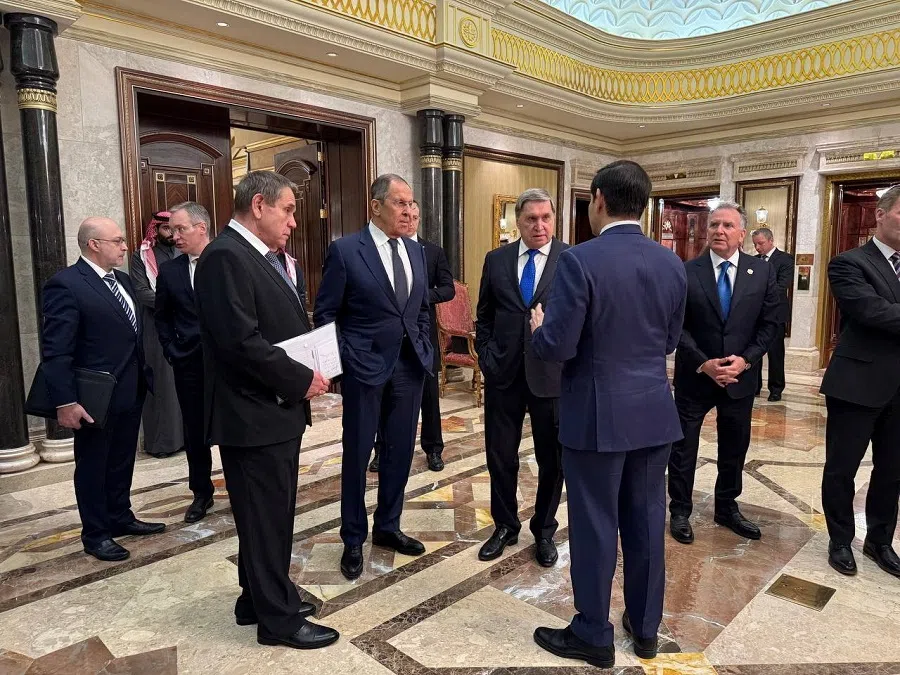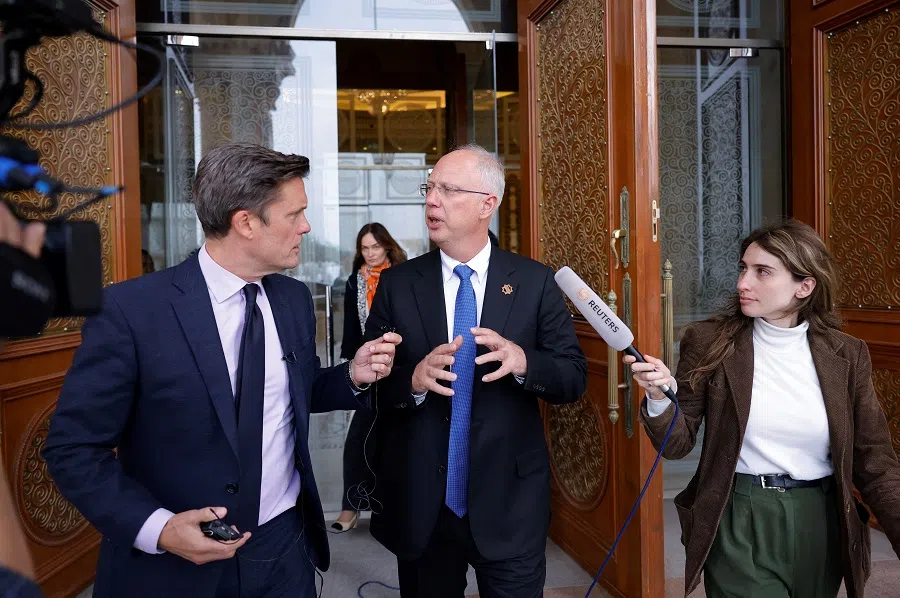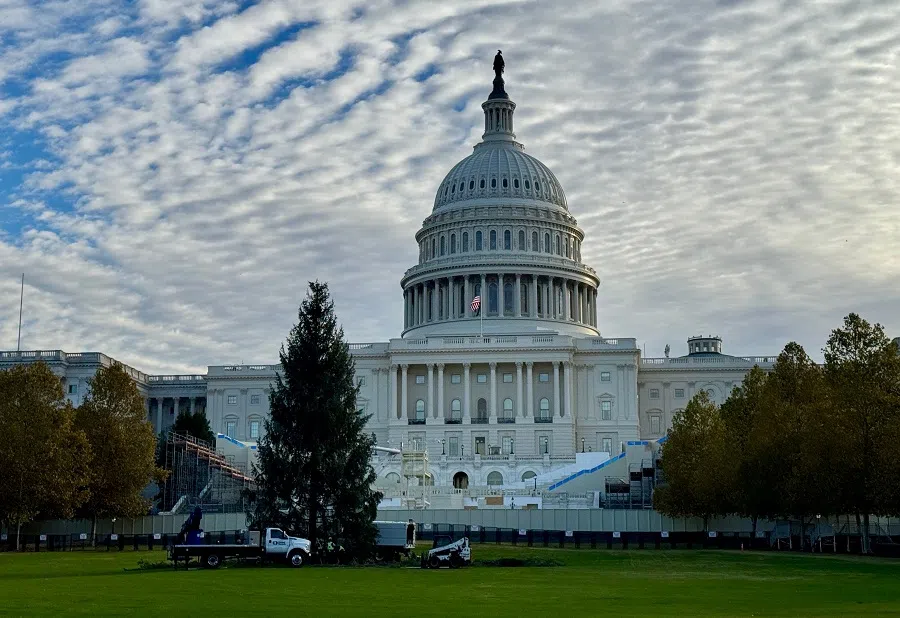The US-Russia partnership: An attempt to contain China?
US-Russia talks aimed at ending the Russia-Ukraine war which excluded the EU and Ukraine have sparked global concern. What does this unexpected partnership between the US and Russia mean for China and the global order? Lianhe Zaobao associate editor Han Yong Hong tells us more.

On 18 February, senior diplomats from the US and Russia held a four-and-a-half-hour bilateral meeting in Riyadh, Saudi Arabia, without any European or Ukrainian representatives present. This meeting, which clearly highlighted the dramatic reversal of values and international strategy under the Trump administration’s “new America”, astonished many commentators within and outside of the US, while America’s European allies were left scrambling and unable to respond effectively.
Four points of consensus reached
According to a unilateral press release issued by the US after the meeting, four points of consensus were reached between the US and Russia. The first was to establish a consultation mechanism to address irritants to their bilateral relationship, with the objective of taking steps necessary to normalise the operation of their respective diplomatic missions.
The second point concerned appointing respective high-level teams to begin working on a path to ending the conflict in Ukraine, while the third point was about laying the groundwork for future cooperation on matters of mutual geopolitical interest and historic economic and investment opportunities which will emerge from a successful end to the conflict in Ukraine. Finally, both the US and Russia agreed to remain engaged to ensure the process moves forward in a timely and productive manner.
Only three out of these four points are substantive, but they are significant. These points mark the eventual restoration of normal diplomatic relations between Russia — initially isolated by the West following the outbreak of the Russia-Ukraine war — and the US. This suggests that US sanctions on Russia may eventually be lifted, while Ukraine, which has endured three years of invasion and conflict, could face a situation where its territory and interests are divided between the US and Russia. The vision of the US and Russia extends beyond the Ukraine war to new geopolitical and economic possibilities, anticipating future cooperation between the two countries including areas such as fossil energy and the Arctic.
Dmitriev also mentioned that he believes some US companies will return to Russia by the second quarter of this year, reflecting his optimistic view that the US might lift sanctions on Russia.

According to Kirill Dmitriev, CEO of the Russian Direct Investment Fund (RDIF), who spoke to the media after the Riyadh meeting, the US-Russia talks included discussions on “specific areas of cooperation”, focusing particularly on joint Arctic projects. Dmitriev, who is trusted by Russian President Vladimir Putin, did not participate in the political talks between the US and Russia, which were led by Russian President Putin’s foreign policy adviser Yuri Ushakov and Foreign Minister Sergey Lavrov, alongside US Secretary of State Marco Rubio and others. However, Dmitriev did attend the economic portion of the discussions.
... the idea of the US allying with Russia to counter China seems improbable, and it is unlikely that the US harbours such illusions.
A fresh start for US-Russia relations?
The Russian side praised the US delegation for not condemning Russia in the same manner as the previous US administration. Beyond geopolitical issues, the talks also addressed deeper cooperation in space, economics, and the global energy market. The US-Russia discussions were held in Saudi Arabia, the world’s largest oil producer, while Russia and the US are the second and third largest oil exporters, respectively. Given US President Donald Trump’s previous claim that the climate change crisis is a “hoax”, the talks raised speculation about the kind of global fossil energy cooperation and positioning that might emerge from this meeting.
Dmitriev also mentioned that he believes some US companies will return to Russia by the second quarter of this year, reflecting his optimistic view that the US might lift sanctions on Russia.
The US, by siding with Russia and distancing itself from Ukraine, showcased to the world a significant reversal in major power diplomatic strategy. It appears that Trump is “playing a very huge game of chess”, diverging from the Biden administration’s approach of uniting Europe, Japan and South Korea to contain China and Russia, instead moving towards abandoning European allies and reconciling with adversaries.

The US and Russia have competing geopolitical interests in the Arctic; after all, Trump’s deep interest in controlling Greenland, which lies within the Arctic Circle, is likely a move to counter Russia’s recently enhanced military capabilities in the region. On the other hand, China and Russia have strengthened their military cooperation in the Arctic over the past year, including holding joint military exercises, conducting aerial training with strategic bombers, and carrying out joint patrols in Arctic waters for the first time, leaving the US feeling uneasy.
Unlikely that the US-Russia partnership is meant to contain China
However, the idea of the US allying with Russia to counter China seems improbable, and it is unlikely that the US harbours such illusions. Firstly, the economic structures of China and Russia are highly complementary, and they share close economic ties. Conversely, the US and Russia are competitors in economic sectors such as energy.
Furthermore, the current China-Russia relationship is arguably at its strongest since the end of the Cold War, while the US and Russia have harboured mutual grievances for many years. It is highly unlikely for the US and Russia to reconcile as suddenly as the US and China did to counter the Soviet Union in the past. Upon his return, Lavrov stated that the current bilateral relations between Russia and China are at an unprecedentedly high level. Lavrov, while attending the G20 meeting in South Africa on 20 February, also met with Chinese Foreign Minister Wang Yi to discuss relations with the US and the conflict in Ukraine, likely briefing China on these matters.
For Russia, this situation is not unfavourable. The US’s reluctance to continue supporting Ukraine in its resistance has given Russia significant space; Russia could possibly even gain benefits from both the US and China.

In contrast, Rubio and US Treasury Secretary Scott Bessent both skipped the G20 meeting, aligning with the Trump administration’s “withdrawal” style, indicating that the approach of forming alliances to counter opponents is not in line with the Trump administration. The US is currently forgoing multilateralism, but it is not embracing isolationism — rather, it is adopting unilateralism, leveraging its advantageous position to pressure opponents one-on-one, in turn maximising the US’s unilateral interests.
For Russia, this situation is not unfavourable. The US’s reluctance to continue supporting Ukraine in its resistance has given Russia significant space; Russia could possibly even gain benefits from both the US and China. Besides Ukraine, the EU is another major loser. As the US and Russia meet in Riyadh, European countries convened an emergency summit, but ultimately failed to reach a consensus even on whether to deploy peacekeeping forces, let alone send troops to defend Ukraine.
When it comes to multilateral organisations like the EU, which lack cohesion, the Trump team seemingly makes no secret of its indifference, focusing on direct negotiations with the countries involved in their diplomatic dealings. This perhaps explains Trump’s repeated hints that Chinese President Xi Jinping will visit the US. Recently, Trump’s eldest son penned an article revealing that Trump’s stance is to willingly negotiate with Xi, at the same time “avoiding poking the dragon in the eye unnecessarily”. Just based on this pragmatic approach, a meeting between the US and Chinese leaders could indeed take place.
This article was first published in Lianhe Zaobao as “美国联俄制中难成真”.





